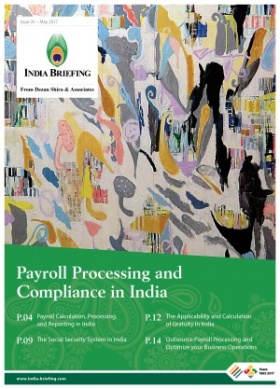Outsource Payroll Processing and Optimize your Business Operations in India
Small and medium enterprises (SMEs) in India may find it challenging to keep track of the country’s changing social security, tax, and regulatory norms when computing payroll for its employees.
This is why it becomes advisable to outsource payroll – which is a functional mix of human resources and accounting – to a qualified third-party service provider. Such a policy frees the company to focus on its core business functions and profit-making operations.
Who should outsource payroll processing?
- Foreign market entrants who are unfamiliar with local regulations;
- SMEs with limited budgets for an independent internal HR department;
- SMEs that desire access to advanced payroll automation software without incurring the related costs; and
- Rapidly expanding companies that need to manage limited time and resources while concentrating on core business goals.
Why should you outsource payroll processing?
- Improved compliance: Outsourcing payroll processing improves a firm’s compliance and oversight record, and therefore limits associated risks. Professional payroll service providers have dedicated staff that specialize in monitoring the latest updates in rules and regulations at the state, federal, local, and industry levels, as well as changes in the withholding tax rates. They calculate payroll taxes, social insurance deductions, manage filings and payments, and will undertake the cost of penalties due to incorrect calculations, under-reporting, or delayed payments so long as accurate personnel information and funds are provided on time.
- Streamlined HR: An internal payroll division involves staffing concerns and running costs, but firms outsourcing payroll can streamline their internal human resources department to focus on managing the company’s relationship with its employees and strategic issues.
- Confidentiality and transparency: The more employees aware of salary details in an organization, the greater the risk that such information becomes public knowledge within the company. Outsourcing payroll ensures that sensitive data stays secure, and only key decision-makers and senior personnel in the firm are aware of the payroll details. At the same time, outsourcing increases transparency in the payroll process – errors can be reported immediately and directly to management without the complications of inter-departmental reporting structures.
Choosing the right service provider
Payroll management has taken on an expanded functionality today, offering client firms an array of services while ensuring the efficient distribution and management of payroll, maintaining compliance, and securing confidentiality of payroll data.
In recent years, firms specializing in payroll outsourcing invest in advanced software that enables them to produce reports according to the exact specifications required by the tax authorities and banks. Small firms or companies outsourcing their payroll functions benefit from access to this human resource information system as well, and without incurring any of the direct costs.Thus, even though payroll outsourcing incurs an overhead expense to the firm, it effectively reduces their overall liabilities and costs, and ensures that more time and resources get spent on critical business functions instead.
Editor’s Note: This article is amended from the issue of India Briefing Magazine titled “Payroll Processing and Compliance in India” where we discuss the most updated calculation of payroll and gratuity in India, social security laws, and the benefits of outsourcing payroll processing.
About Us
India Briefing is produced by Dezan Shira & Associates. The firm assists foreign investors throughout Asia and maintains offices in China, Hong Kong, Indonesia, Singapore, Vietnam, and Russia.
Please contact india@dezshira.com or visit our website at www.dezshira.com.
- Previous Article New RBI Guidelines on Issuance of Masala Bonds
- Next Article After GST, Services Sector Face New Challenges in India











